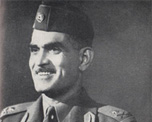Iraqi officer and politician, Abdol-Karim Qassem was born in Baghdad, 1914. His father was a Sunni of Zobeid Qahtani tribe and his mother was a Shiite from Tamim Adnani tribe. He was brought up in a poor family and passed his early youth helping his father in carpentry and farm. He was graduated...
Iraqi officer and politician, Abdol-Karim Qassem was born in Baghdad, 1914. His father was a Sunni of Zobeid Qahtani tribe and his mother was a Shiite from Tamim Adnani tribe. He was brought up in a poor family and passed his early youth helping his father in carpentry and farm. He was graduated in literature from high school earning high scores. He was a calm student keeping distance from his classmates. He became a school teacher in Shamieh in Qadessieh, south of Iraq. He entered the military college in 1932, and was graduated in 1934 as a second lieutenant. He entered Staff College in 1940 and became a brigadier general some 15 years later. He was commandant officer of an Iraqi brigade and became the head of the “free officers” committee devoted to overthrow the Iraqi imperial dynasty and to put an end to the Iraq o British relationship.
Aided by Colonel Abdol-Salam, General Qassem deposed Malek Feissal II by a violent military coup, 14th July, 1958, and declared republican government in Iraq. He became prime minister and minister of defense and formed a committee of three men for the administration of the country. He was promoted lieutenant general of the staff. He was seriously wounded in an assassination attempt by a group of five people, Saddam Hussein being one of its members.
He was an ardent patriot but had no ideas of methods of administration. He had no knowledge of world affairs either. He was very merciful and this was not an appropriate tactic to keep the power.
His early foreign policy showed his inclination to establish friendly relationship with Iran. Iran recognized the new regime of Iraq in 1958. However, later on he embarked on expansionist policies towards Iran asserting baseless claims about Arvandrud and Khuzestan. The frontier disputes added by the new political and ideological differences led to a crisis in the relations of the two countries in 1959 and 1960.
Abdol-Karim’s leftist thoughts led him to keep close relationship with the Soviet Union, China and other socialist countries. He entered into contracts for purchasing arms and ammunitions from the Soviet Union. He pursued an anti American policy and withdrew from the Baghdad Treaty, while the Pahalvi regime continued its membership in the treaty now called the CENTO.
Eventually, the 1963 coup of Iraq led to the fall of Abdol-Karim Qassem and coming to power of AbdolSalam, and Abdol-Karim’s being murdered by the men involved in the coup.
https://iichs.ir/vdch.znzt23nqm10d2.html
iichs.ir/vdch.znzt23nqm10d2.html
